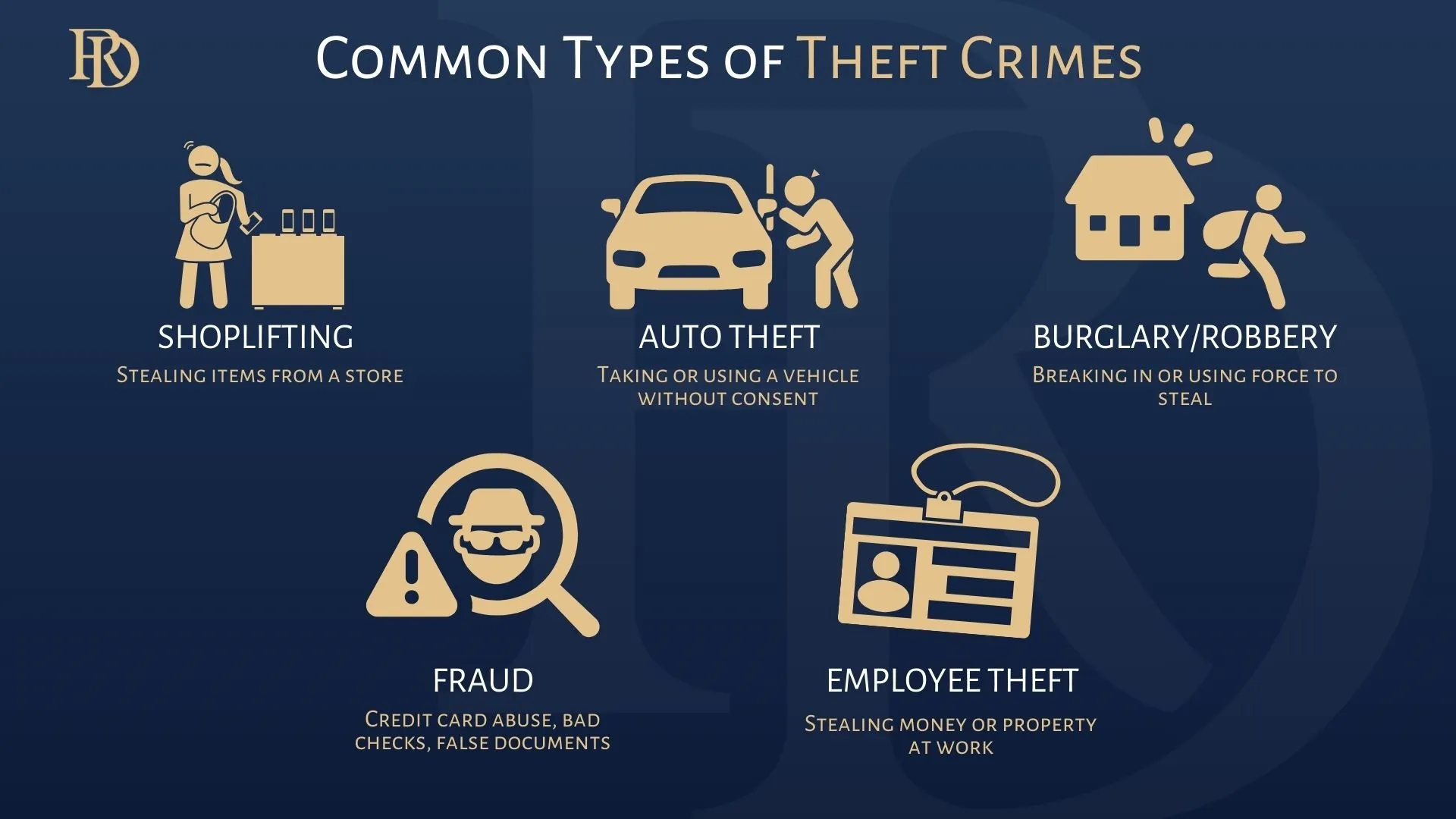
Round Rock Theft Crime Lawyer
Being accused of theft in Texas is not a minor matter. Even seemingly small allegations like shoplifting can lead to jail time, fines, and a permanent criminal record. Attorney Ryan H. Deck is a Texas Board-Certified theft criminal defense lawyer serving Williamson County, providing aggressive representation in theft cases and protecting your future.
Theft Charges in Texas

Under the Texas Penal Code, theft is generally defined as unlawfully taking someone else’s property with the intent to deprive them of it. What begins as a shoplifting case can quickly escalate into a state jail felony or higher if the property value is significant or aggravating factors exist.
Common types of theft offenses in Texas include:
- Shoplifting: Taking goods from retail stores without paying.
- Auto theft & unauthorized use of a vehicle: Driving or keeping a car without the owner’s consent.
- Burglary & robbery: Entering property or using force to steal, sometimes involving a deadly weapon.
- Credit card & check fraud: Using identifying information, insufficient funds, or false documents to obtain property.
- Employee theft or embezzlement: Taking money or property from an employer.
- Property crimes overlap: Theft often links with criminal trespass or criminal mischief charges.
Ryan H. Deck is an experienced criminal defense attorney in Williamson County who has defended theft cases ranging from minor shoplifting to aggravated robbery. As a former Montgomery County Assistant District Attorney, he has extensive trial experience, and he knows how prosecutors think and how to counter their tactics.
Petty Theft vs. Grand Theft
In Texas, theft charges scale with the value of stolen property:
- Petty theft: Typically Class C, B, or A misdemeanors (stolen property worth less than $2,500). Penalties can include fines, community service, and up to 1 year in county jail.
- Grand theft: Felony theft cases where property is valued over $2,500 or involves aggravating factors. Depending on the value, charges can range from a state jail felony punishable by 180 days to 2 years, up to a first degree felony punishable by 5–99 years in prison.
Penalties for Theft in Texas
Texas theft laws classify penalties based on property worth and circumstances:
Consequences of a Theft Conviction
A theft conviction carries more than just court penalties. It can follow you for life in ways that affect every opportunity ahead:
- Permanent criminal record: Once convicted, theft becomes part of your criminal history and can appear on background checks for jobs, housing, and even student loans. Unlike minor infractions, theft is considered a crime of dishonesty, and employers often view it as a serious red flag.
- Professional impact: Many professions, including banking, finance, teaching, and healthcare, require trust and fiduciary responsibility. A theft conviction can disqualify you from holding licenses, block you from promotions, or even cost you your current career.
- Financial burden: Beyond fines and restitution ordered by the court, victims may file civil lawsuits seeking repayment for stolen property. Combined with court costs and probation fees, these penalties can create long-term financial strain.
- Reputation damage: Theft charges carry a stigma that can follow you in your community. Friends, neighbors, and colleagues may lose trust, making it harder to rebuild your reputation or pursue opportunities.
- Immigration risks: For non-citizens, theft is often considered a “crime of moral turpitude”. A conviction can lead to denied visas, loss of legal status, or even deportation, regardless of how minor the original offense may seem.
Strategies Against Theft Charges
Every theft case has unique circumstances, and a strong defense depends on exposing weaknesses in the prosecution’s case while building credible alternatives:
Challenging Intent
The prosecution must prove you intended to permanently deprive the owner of their property. If the evidence shows the property was borrowed, taken by mistake, or there was no intent to keep it, the charges may not meet the legal definition of theft.
Mistaken Identity
Theft accusations often rely on eyewitness testimony or unclear surveillance footage. These can be unreliable, especially in busy stores or parking lots. If you were misidentified or if evidence places someone else at the scene, we can fight to show you were not involved.
Property Ownership Disputes
Not all property disputes are crimes. If you had a legitimate claim, believed the property was yours, or shared rights to it, the case may be a civil matter rather than a criminal one. Proving ownership disputes can lead to charges being dropped or reduced.
Insufficient Evidence
The burden of proof lies with the prosecution, and if their evidence is weak, the case cannot stand. Missing surveillance, unreliable witnesses, or mishandled stolen goods can all be grounds for dismissal. We challenge every piece of evidence for accuracy and legality.
Reduced Charges
Even when the state has evidence, negotiations can make a difference. Many theft cases can be reduced from a felony to a misdemeanor, or resolved through probation and restitution instead of jail time. This strategy helps protect your record and future.
Why Hire Attorney Ryan H. Deck

When facing theft charges in Williamson County, the lawyer you choose can change the course of your case and your future. Ryan H. Deck offers:
- Extensive trial experience: With years spent defending theft offenses ranging from shoplifting to aggravated robbery, Ryan understands how local prosecutors build cases — and how to dismantle them.
- Texas Board-Certified in criminal law: Board certification is a rare distinction, and it is considered a career-defining achievement. Only Board Certified lawyers are allowed, by the State Bar of Texas, to publicly represent themselves as a specialist or expert in a specific area of the law.
- Personalized attention: You won’t be passed off to an associate. Ryan works directly with you, learning your circumstances and goals to build a defense tailored to your situation.
- Strategic defense: Every theft case has weaknesses. Ryan focuses on identifying gaps in the prosecution’s story, challenging unlawful evidence, and developing strategies to secure the best possible outcome.
- Proven results: His record includes case dismissals, reduced charges, and favorable jury verdicts, giving clients confidence that their future is in capable hands.

Target

Let Us Protect Your Rights Against Theft Charges
A theft conviction can ruin your record and reputation. Attorney Ryan H. Deck has extensive trial experience and will fight for reduced charges, case dismissal, or the best possible outcome.

Defend Your Freedom Today
Accused of theft in Texas? Don’t wait — early legal intervention can make the difference between reduced charges, case dismissal, or a conviction that follows you for life. Complete the form below to schedule a free, confidential consultation with Attorney Ryan H. Deck, an experienced theft defense lawyer who has spent nearly two decades protecting clients in Round Rock and Williamson County.
Get straightforward advice, a clear strategy, and the strong defense your future deserves.


Commonly Asked Questions
This is some text inside of a div block.
Is shoplifting always a felony in Texas?
No. Shoplifting under $2,500 is a misdemeanor, but higher amounts or repeat offenses can become felony theft.
Can theft charges be dropped?
Yes, if there’s insufficient evidence, a valid ownership claim, or successful negotiations with the prosecutor.
What is the difference between theft and burglary?
Theft is taking property unlawfully, while burglary involves entering a building or vehicle with the intent to commit theft or another felony.
What happens if I’m convicted of a state jail felony theft?
A state jail felony is punishable by 180 days to 2 years in state jail and up to a $10,000 fine.
Do I need a lawyer for a misdemeanor theft case?
Yes. Even a misdemeanor conviction creates a permanent criminal record and can harm employment opportunities.


